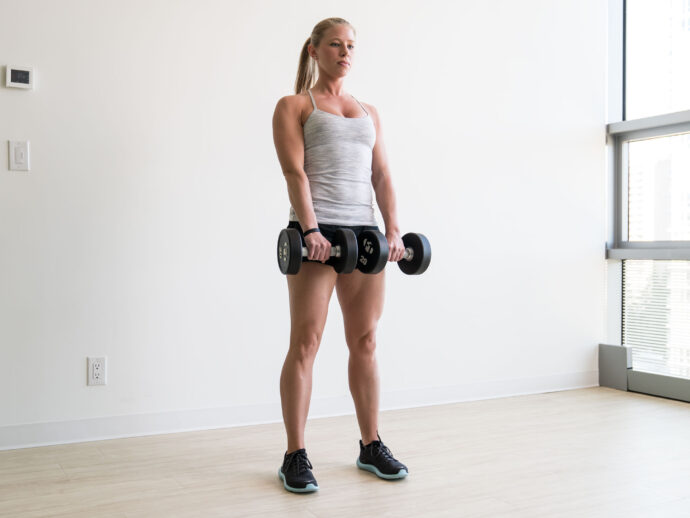
No matter your age, you can lower your risk of osteoporosis by increasing your bone mineral density. We show you how to build healthy bones with our 30-minute bone-strengthening free weight workout.
The not-so-good news: bone density naturally decreases as we age. Since women generally have smaller bones than men, those who have especially low bone density are at risk of developing osteoporosis, which results in brittle, fragile bones that can more easily fracture. Estrogen, which protects bones, decreases as women reach menopause, also increasing our risk of osteoporosis.
The good news: women at any age can prevent bone loss—and even build new bone—by engaging in regular strength training. Aim for at least two strength workouts each week, training all major muscle groups each time.
Your strong bone workout
Complete exercises as supersets: groups of two exercises performed in A, B, A, B fashion. Aim for three rounds of 10 to 12 reps, using weights that feel very challenging by rep number seven.
How to choose weights
To have the most effect on strengthening your bones (and muscles!), use weights that feel heavy to you—but not so heavy that you compromise your form. For the 10 to 12 rep range we use here, rep number 7 should feel very challenging. A good rule: if you can perform 15 reps with a particular weight, it’s too light.
For example, a woman weighing between 130 and 150 lbs would use the following weights for 10 to 12 reps of single arm dumbbell rows:
- beginner: up to 20 lbs
- intermediate: 25 to 35 lbs
- advanced: 40 to 50+ lbs
When it comes to the weights themselves, you have options. If you have gym access, you’d most likely use commercial dumbbells labelled by weight. If you’re training at home, I’d recommend a set of adjustable dumbbells, where each dumbbell ranges from 5 to 50 lbs and you can quickly change its weight.
Exercise A: Deadlifts
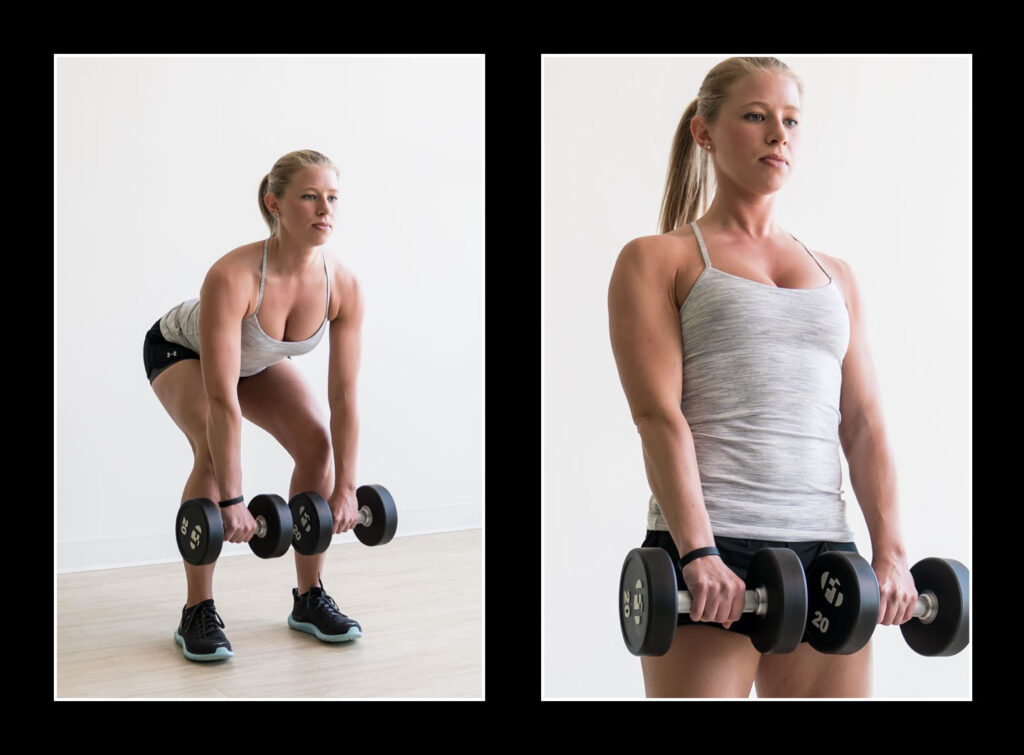
Target: Hamstrings, glutes, low and upper back
Deadlifts work almost every muscle on the back of your body.
- Stand with feet shoulder-width apart, arms straight, holding dumbbells against the front of your thighs.
- Hinge your hips behind you and bend your knees, keeping your back flat and your head in line with your spine. The dumbbells will travel along your body; keep them almost touching your legs as they travel downward.
- Once the dumbbells reach halfway down your shins, press through your heels, focusing on using your hamstrings and glutes to pull yourself back up to the start position.
Exercise B: Bulgarian Split Squats
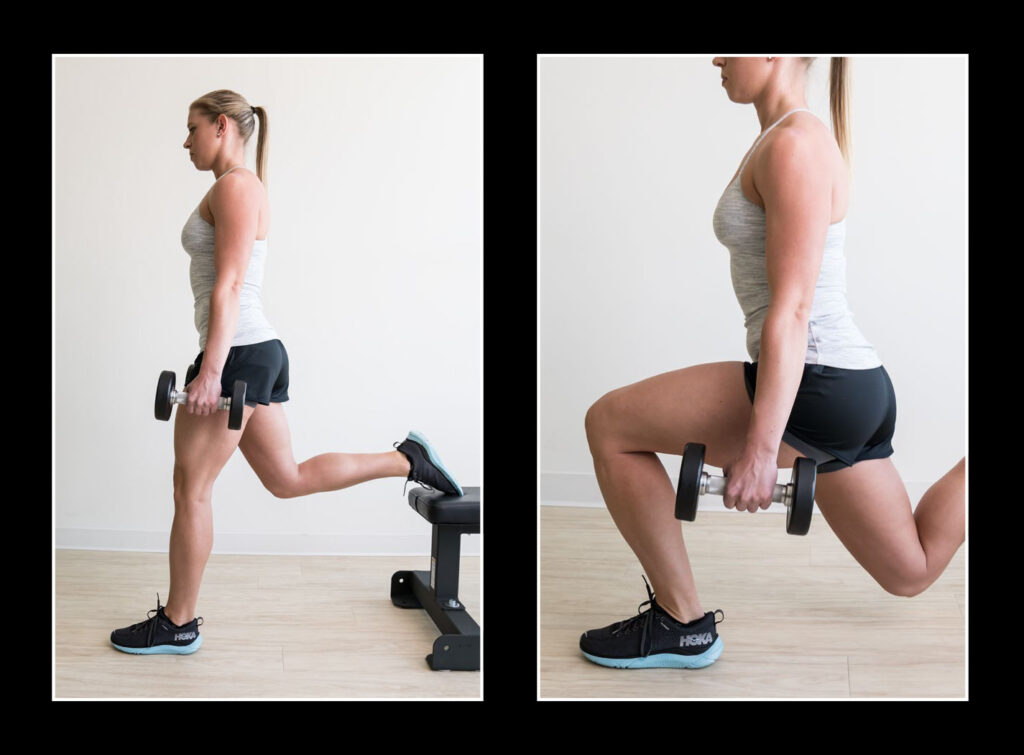
Target: Quads, glutes
In addition to strengthening your muscles and bones, this exercise improves your balance and hip mobility.
- Stand holding dumbbells at your sides, left foot forward and right foot elevated behind you on a bench.
- Squat down by flexing your left knee and hip. Your left knee should form a 90-degree angle, and right knee should come close to the ground.
- Press through your left foot to return to the start position. Repeat for reps, then switch to the other side.
Exercise A: Incline Bench Press
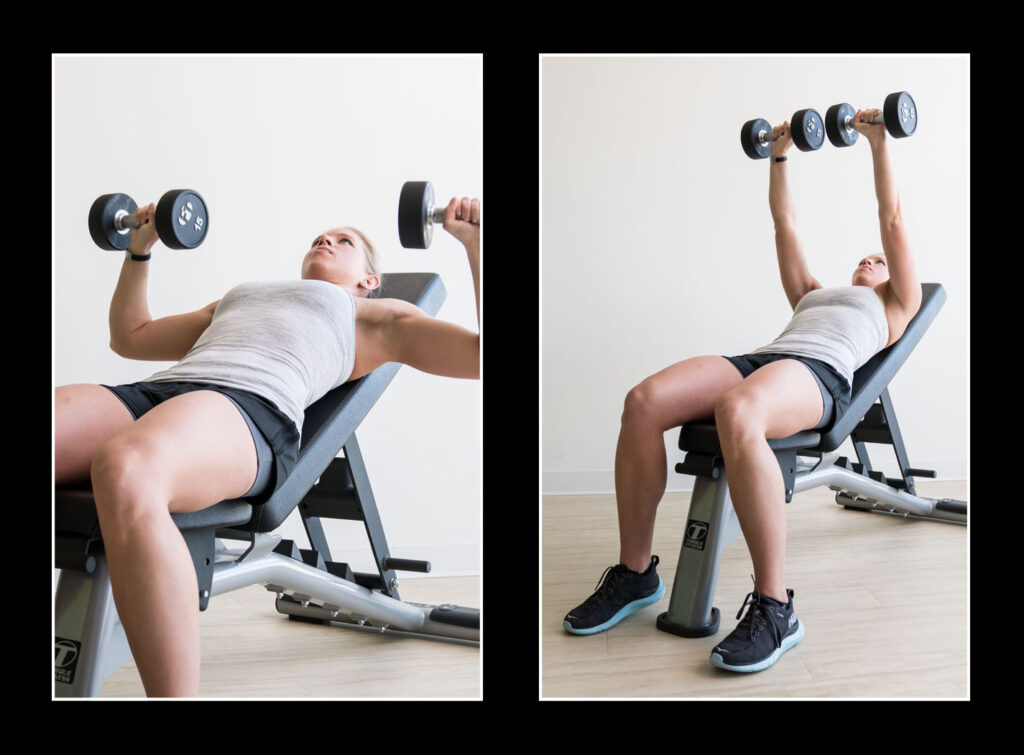
Target: Chest, shoulders
A fundamental strength training exercise that improves muscle and bone density in your upper body.
- Set a weightlifting bench to a 30-degree incline. Sit with dumbbells resting on your thighs.
- As you lean back onto the bench, bring the weights to each side of your chest, with your upper arms under each dumbbell.
- Press the dumbbells up until your arms are extended. The weights should follow a slight arc, moving inward once you reach the top of the movement. Lower the weights to the sides of your upper chest and repeat.
Exercise B: Dumbbell Row
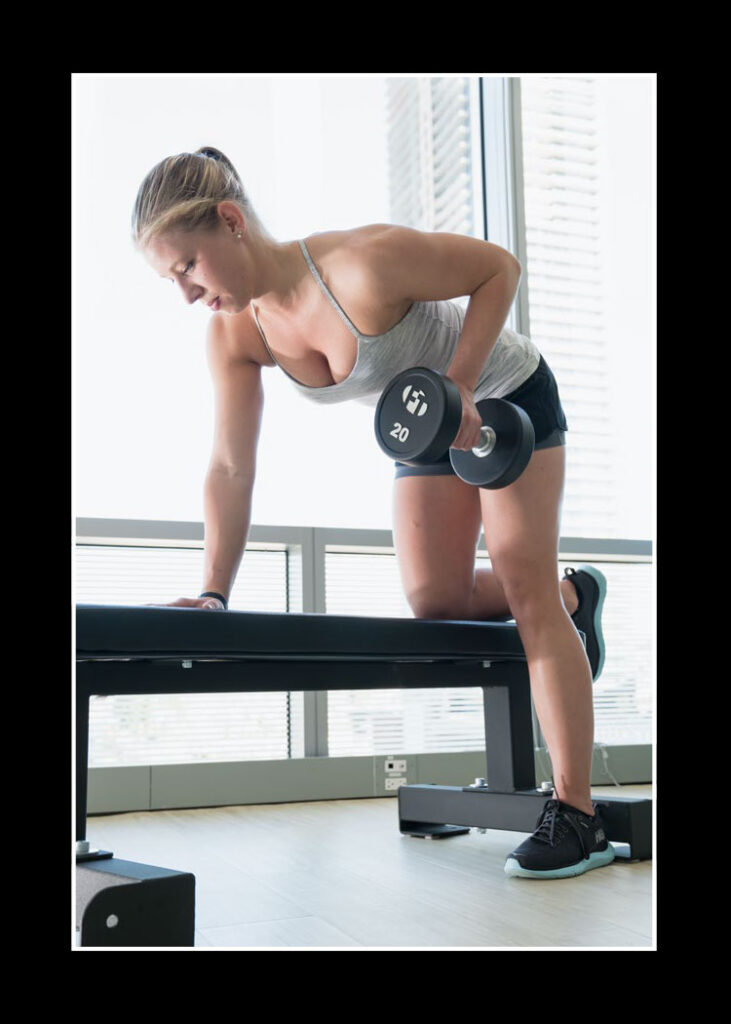
Target: Back, core
Rows strengthen the major muscles in your back, which can help improve your posture. As long as you maintain good form, don’t be afraid to go heavy on this one.
- Kneel on the side of a bench, with your right knee and hand on the bench, spine neutral. Position your left foot on the floor, slightly behind you. Grab your dumbbell from the floor.
- Keeping your back flat and abs braced, and without rotating your torso, pull the dumbbell up your side until your upper arm is just beyond horizontal. You should feel your left shoulder blade moving toward your spine.
- Lower the weight with control, and repeat for reps.
Exercise A: Overhead Press
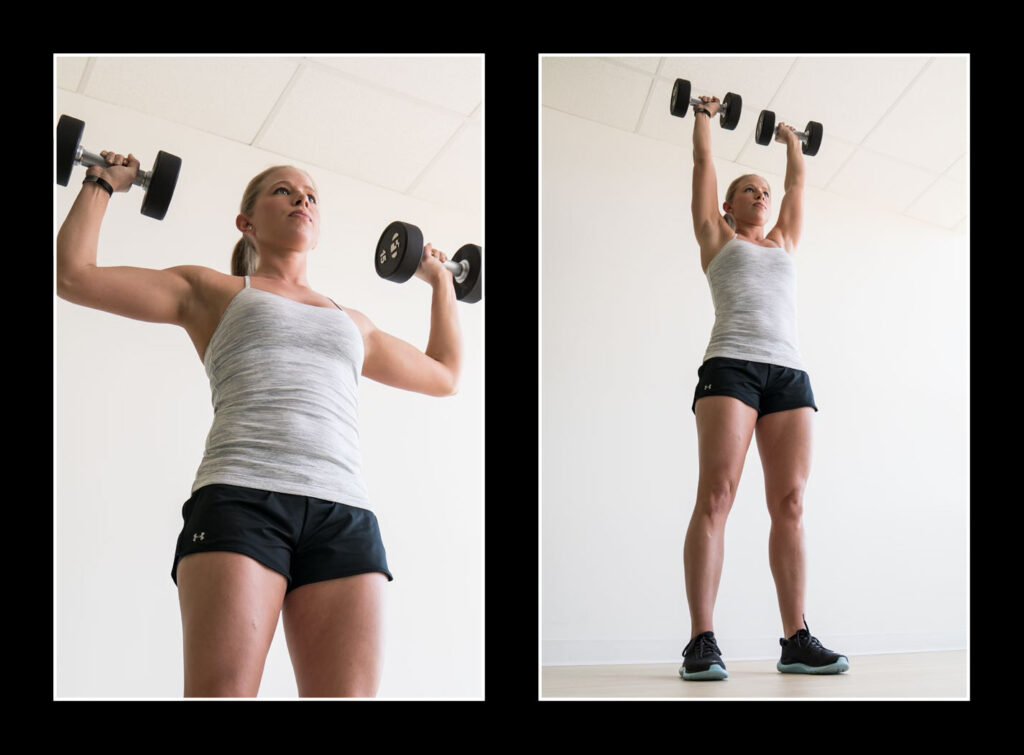
Target: Shoulders, core
Here’s an upper body staple that strengthens the shoulders. You’ll also fire up your core, which stabilizes your body during the movement.
- Hold a dumbbell in each hand, positioned to the outside of your shoulders. Your palms should be facing forward, with elbows under wrists.
- Press the dumbbells overhead until your arms are extended and the dumbbells are almost touching. Lower with control, and repeat for reps.
Exercise B: Goblet Squat
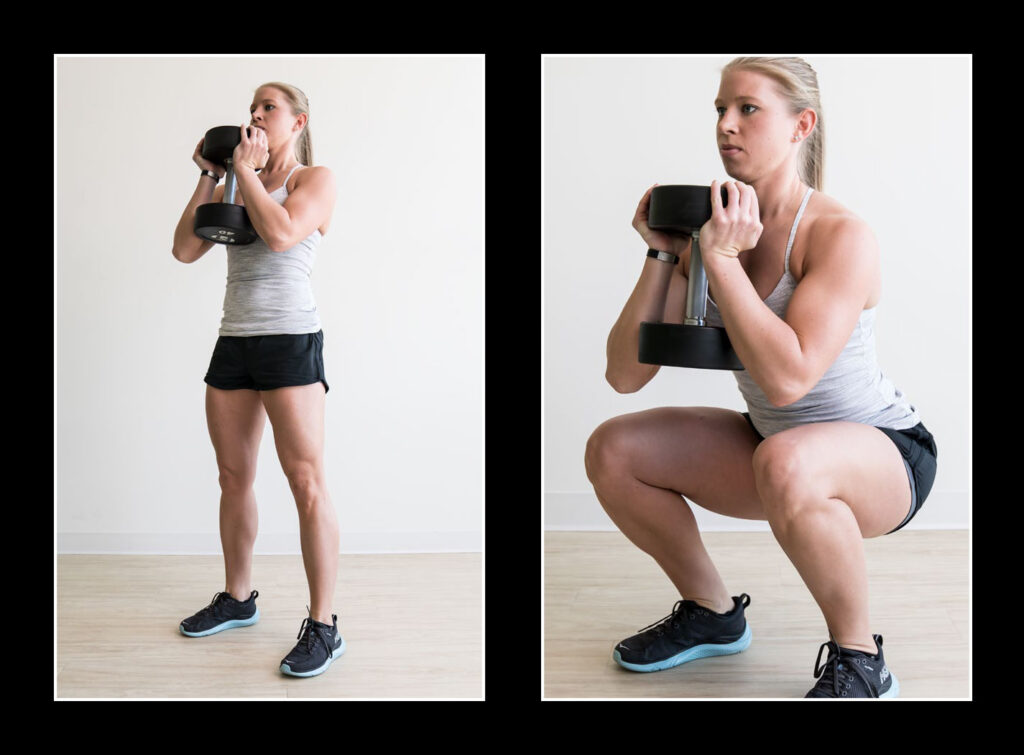
Target: Quads, glutes, hamstrings
Research shows that squats are particularly effective at improving bone strength. Squatting is an important and fundamental movement that improves strength and has excellent carryover into daily movement patterns as well.
- Stand with your feet a bit wider than shoulder width, holding a dumbbell with both hands (by one end) at chest level.
- Keeping your chest tall and your back flat, hinge your hips back behind you and bend your knees so your thighs are parallel to the floor. Go as low as you can without rounding your spine. Press into the floor with your feet to return to standing.
Foods to eat that support bone health
If you’re not getting enough calcium in your diet, your body will pull calcium from your bones. In addition to making sure you get enough calcium (1,000 mg per day for women 50 and under; 1,200 mg per day for women 51 and older), you also need to ensure you’re getting enough vitamin D (600 IU per day for adults and 800 IU per day for adults over 70). Get your vitamin D levels checked regularly, and supplement if necessary.
The Harvard School of Public Health created an evidence-based food guide that doesn’t include dairy in its recommendations. It states, “While calcium and dairy can lower the risk of osteoporosis and colon cancer, high intake can increase the risk of prostate cancer and possibly ovarian cancer. Plus, dairy products can be high in saturated fat as well as retinol (vitamin A), which at high levels can paradoxically weaken bones.”
Great sources of calcium include
- dark leafy greens
- tofu
- legumes, such as beans
- fortified soy milk
Featured athlete: Shannon Payeur (@runshannyrun)
Location: Trinity Physiotherapy, Sport & Wellness (trinitypysio.com)







